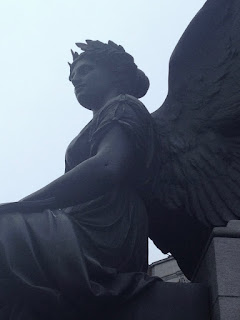 |
| The Proclamation. |
The document called for a provisional government of the Irish Republic – an illegal move in the eyes of the occupying British, which led to violence. And despite fierce resistance by about 1,300 members of the Volunteer Irish Army throughout Easter week, the Brits sent reinforcements and ultimately crushed the rebels.
 | ||
| Look at this angel's elbow. It has a bullet from 1916. |
So, with that context, each of us got to select a prominent player in the Rising. I chose Joseph Mary Plunkett, one of the signatories of the proclamation, an organizer of the rising, a poet and former editor of the literary publication The Irish Review. Our assignment was to write a blog post to provide a little sketch about our person. I gravitated toward Plunkett because he was a kind of journalist. Then he kept getting more interesting the more I read about him. But I couldn't find many of his own writings.
 |
| Straight out of The Neverending Story. |
So I went through the rest of the bookshop. After about 20 minutes, I thought about leaving. But something seemed to nag at me. I went back to that Irish book section and started looking at the lower shelves. That's when, to my astonishment, I found an original copy of the book of Plunkett's poems published in 1916 – after his execution.
 |
| Not bad for 20 Euros, huh? |
When I brought it up to the register, the shopkeeper said he was so glad to see someone buy it. He said he had recently come into possession of it and brought it to a book fair in Dublin the previous weekend thinking that someone would surely snap it up amid the 100th anniversary of the Rising. He said he was close to selling to someone, but the prospective buyer backed out.
"It must be meant to be for you then," he told me.
I don't know that I believe in fate, but I certainly believe in good (true) stories.
 |
| Plunkett's wife Grace drew this picture a month after they married and the British executed Joseph. You can read my blog post about Plunkett on our program's blog, Murray State Irish Literature Study Abroad. |
No comments:
Post a Comment